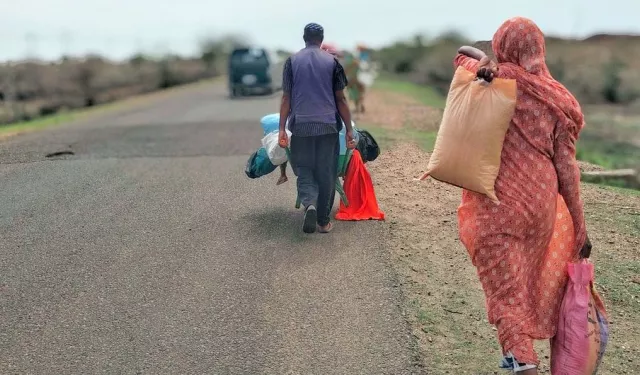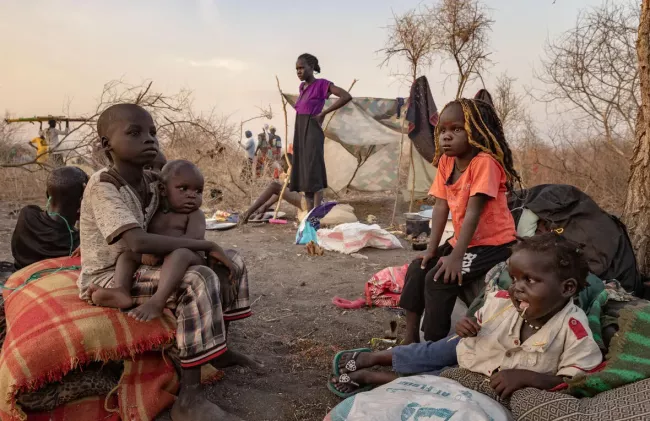
From Supreme Court judge to shopkeeper, Sudan’s war shatters professions
Journalist, teacher or financier.. survival means shedding and reinventing
In the district of Al-Jarif, in Sudan’s East Nile Province, a medium-built man walks steadily from door to door, knocks without a word, delivering water. He offers a brief smile, and moves on.
Few know that this man, known simply as “Masa the water guy,” was once Khalid Masa, a prominent Sudanese journalist. But war does not spare the dignity of professionals.
When Khartoum spiraled into ruin, journalism was the first casualty. Newspapers became liabilities, articles became indictments, and access to printing houses vanished. With the outbreak of war, Sudan’s print journalism came to a complete halt for the first time in more than 120 years.
“In wartime,” Masa told Al Manassa, “a new journalism was born. One that buried truth with it.”
Since April 2023, the war between Sudan’s Armed Forces/SAF and the Rapid Support Forces/RSF has claimed thousands of lives and displaced 14 million people, exposing them to sexual violence, theft, and the destruction of homes, health facilities, markets, and other vital infrastructure.
This war hasn’t just destroyed buildings; it has shattered the mirrors in which people saw themselves. It has stripped them of their professions and forced them to search for new identities—ones rooted not in careers but in survival.
Millions of civilians have paid a steep price. The World Health Organization recorded about 20,000 deaths by the end of last year, while researchers estimate the unreported toll to be multiple times higher, with one suggesting that around 61,000 people were killed in Khartoum State alone in just 14 months.
The water seller
Masa was forced to rebuild his life from less than zero. No savings, no pension, no alternatives. All he had was his body, his local connections, and a dignity still fighting not to break. He chose to deliver water.
He didn’t feel humiliated. On the contrary, he felt a moral continuity between the career he had left and the one that embraced him. “Both come from the same source: a sincere desire to serve people, to respond to their needs, to be among them,” he said.
As he walked through the alleys, the Sudanese journalist became a witness to tragedy. He listened to widows mourning husbands lost to combat and saw children searching for milk that no longer arrived from the frontlines. Through these moments, he began to “rediscover himself.”
Masa spent ten years in journalism, covering politics, sports, and human rights. “April 2023, when the first shot rang out in Khartoum, I was there. I wasn’t looking for a scoop, but for an explanation of what was happening. Suddenly, there was no time for questions. The camera became an accusation.”
The city became a trap. Journalists couldn’t leave their homes without disguise, wrote in secret, edited their words ten times before publishing. The profession they chose freely had become a prison.
Institutions seized to operate. Any attempt to continue working was a risk. “Still, there was this internal urgency. How can I abandon my voice while I belong to a profession that taught me to see events through people’s eyes?”
The dilemma wasn’t just security related, it was financial. “Some foreign organizations still support Sudanese journalists,” he said, “but working with them from inside besieged Khartoum is like a skyfall without a parachute.”
From supreme court to stacking shelves
Like Masa, war forced Fateh Omar to abandon his profession. A former judge in the Supreme Court of Kordofan, he did not leave the judiciary by choice. War erupted and consumed everything; his home, his job, the country that was supposed to be governed by law instead of guns.
Today, in a neighborhood in Benghazi, Libya, Fateh Omar mans the cashier in a small shop. In his mid sixties, he counts bills, stacks milk cans, and smiles at customers.
He fled from El-Obeid city in haste, without goodbyes, boarding commercial buses packed more with survivors than travelers. He made the long journey to Darfur, then slipped across the border into Libya with the help of smugglers who knew the paths as well as he once knew legal statutes. He didn’t negotiate—those fleeing death don’t haggle for life.
Fateh left behind a courthouse that once dispensed justice but had now become a barracks or rubble, the distinction meaningless. His flight wasn’t just for safety, but also an internal journey to grasp what remained of himself after being stripped of his robes, seal, and pen.
He told no one about his past, but his wife saw the change in his eyes. He was no longer the judge on the bench, but a father trying to keep bread on the table.
“Justice isn’t the trappings of court,” he told Al-Manassa. “It’s a principle. And principles can live even among the shelves of a store.” He still thinks about going back “when this chaos calms down.”
Fateh knows the position he left might not be there when he returns, or may be occupied by someone who knows nothing of the law except how it serves their weapons. Still, he believes a judge’s role is not only to pronounce verdicts, but to protect meaning.
Yet here he stands firm in the small shop. No longer a judge, but someone who chose defiance even stripped of his title and his nation.
According to the UN, continued fighting has displaced some 11.5 million people, making Sudan’s internal displacement crisis the largest in the world today.
The market as refuge
Hadi Ali Radi, a well-known writer and Arabic teacher, never imagined he’d end up selling plastic bags in an informal market. Like many professionals and intellectuals, he found himself out of work when schools collapsed and libraries closed. He went from teacher to vendor in a market that knew neither his books nor his history.
“Plastic bags are light, flimsy, and tear easily; just like our lives now,” he told Al Manassa, summing up everything.
In Shendi’s mobile phone market, Ahmed Moatasem sits behind a small table like everyone else. But no one knows he was once a professor of economics at the University of Khartoum, where people called him “doctor” and his pocket held the key to an office that commanded respect.
When the war broke out, he thought it would be brief. He left his office and fled Khartoum, hoping to return soon. But the war dragged on.
Ahmed entered the market timidly, unfamiliar with the jargon and tricks of trade. But he learned. He became “Ahmed the phone guy.” And with every call of that name, something inside him cracked—not from pride, but because in this country, a person is defined by their job. Lose it, and you vanish.
In Atbara of Sudan, Suleiman Wada'a, a former finance director, now sells falafel under a broken electric pole. He puts up no sign and doesn’t correct those who call him “Hajj.” Like many, titles no longer matter to him. Only making a living does.
The war between the SAF and the RSF has caused the world’s largest humanitarian catastrophe. Nearly half the population is facing acute food shortages, and around 30.4 million people—more than two-thirds of Sudan’s population—need humanitarian assistance.
In these conditions, returning to one’s homeland, job, or even a semblance of life feels like a dangerous gamble. Return isn’t just about crossing borders. It demands safe infrastructure, a functional healthcare system, and institutions that respect and serve citizens rather than oppress or neglect them.
Still, Masa longs to return to writing. He scribbles notes, stores stories, and mentally rewrites sentences while filling water barrels, waiting for the day peace returns to his country and words return to their rightful place. As he put it, “I will return carrying true stories, written by my feet on scorched earth, and heard by my ears in the thick of thirst.”

